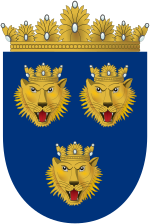Autonomist Party
|
Autonomist Party
Partito Autonomista Autonomaška stranka |
|
|---|---|
 |
|
| Leaders |
Niccolò Tommaseo Leonardo Dudan Frano Getaldić-Gundulić Antonio Bajamonti Francesco Borelli |
| Founder | Niccolò Tommaseo |
| Founded | 1865 |
| Dissolved | 1915 |
| Ideology |
Dalmatianism (official) Italian irredentism Conservatism |
| Political position | Right-wing |
The Autonomist Party (Italian: Partito Autonomista; Croatian: Autonomaška stranka) was a Dalmatianist political party in the Dalmatian political scene, that existed for around 70 years of the 19th century and until World War I. Its goal was to maintain the autonomy of the Kingdom of Dalmatia within the Austro-Hungarian Empire, as opposed to the unification with the Kingdom of Croatia-Slavonia. The Autonomist Party has been accused of secretly having been a pro-Italian movement due to their defense of the rights of ethnic Italians in Dalmatia. The Autonomist Party did not claim to be an Italian movement, and indicated that it sympathized with a sense of hetereogeneity amongst Dalmatians in opposition to ethnic nationalism. In the 1861 elections, the Autonomists won twenty-seven seats in Dalmatia, while Dalmatia's Croatian nationalist movement, the National Party, won only fourteen seats. This number rapidly decreased: already in 1870 autonomists lost their majority in the Diet, while in 1908 they won just 6 out of 43 seats.
Traditionally linked to the idea of a Dalmatian nation advocated by Niccolò Tommaseo in the first half of the 19th century and regarded as a meeting of the Latin world with the Slavic world, initially the party also attracted the sympathies of some of the Slavic Dalmatians, while maintaining an undisputed open to the Italian cultural world.
The Dalmatian branch of the People's Party (Croatian: Narodna stranka, Italian: Partito del Popolo), which supported the reunification of Dalmatia with the remainder of Croatia, viewed the Autonomists as supportive of an Italian annexation of Dalmatia, which was indeed the ambition of the Italian state. The Autonomist Party received the vote of the Dalmatian Italians and some bilingual Slavs and controlled most Dalmatian coastal cities: this party had a majority in the Parliament of Dalmatia in the mid-19th century. However, in 1870 democratic alterations to the electoral laws allowed the majority Croatian population of Dalmatia to influence the elections for the first time. The democratic reforms allowed for a greater part of the general population to vote (but even areas where non-Slav population was the majority were affected) and so the Autonomist Party no longer had a majority: by the outbreak of World War I, only the city of Zara (now called Zadar) remained in Autonomist hands.
...
Wikipedia
